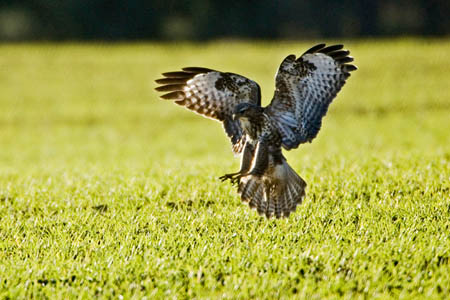The coalition Government has performed a u-turn on its plans to capture birds of prey and blast their nests with shotguns.
Wildlife minister Richard Benyon had planned to spend £375,000 of taxpayers’ money on a research project that would have involved capturing buzzards and destroying their nests.
The minister, a keen supporter of fieldsports, planned the project to gauge the raptors’ effects on pheasants.
But in the week that has seen a Government climbdown on the pasty tax, dilution of the caravan tax and proposals for closed court hearings, the Department for the Environment, Food and Rural Affairs has abandoned the buzzard plans in the face of public outcry.
Mr Benyon said: “In the light of the public concerns expressed in recent days, I have decided to look at developing new research proposals on buzzards.
“The success of conservation measures has seen large increases in the numbers of buzzards and other birds of prey over the last two decades.
“As minister for wildlife I celebrate that and since 2010 we have championed many new measures to benefit wildlife across England – set out in our England biodiversity strategy.
“At the same time it is right that we make decisions on the basis of sound evidence and we do need to understand better the whole relationship between raptors, game birds and other livestock.
“I will collaborate with all the organisations that have an interest in this issue and will bring forward new proposals.”
The Royal Society for the Protection of Birds hailed the move as a victory for people power. It said it was pleased an outpouring of public concern for a much loved bird has encouraged Mr Benyon to drop proposals to licence the destruction of buzzard nests and to bring adult buzzards into captivity around shooting estates.
RSPB conservation director Martin Harper said: “We’re pleased the minister has listened to people’s concerns and acted in the public interest by cancelling this project.
“This is a strong decision, reflecting the strength of the nation’s desire to see Government protecting precious wildlife.
“The recovery of the buzzard is being celebrated by the public after many decades of persecution. It is clear they don’t want their taxes being spent on removing buzzards and the Government has to ensure that no bird of prey will be killed in the name of sport.
“We don’t want anything to distract Defra from the pressing task of saving our threatened wildlife. It should be putting its limited resources into areas such as preventing the extinction of hen harriers in England.
“Government-backed research has already concluded that illegal persecution is limiting the populations of golden eagle and hen harrier. The RSPB believes there are well-tried non-lethal solutions to reducing impacts of buzzards at pheasant pens.”
Tim Bonner, campaign director for the Countryside Alliance, said: “The Countryside Alliance is bitterly disappointed by Defra’s u-turn on this sensible, proportionate, study into buzzard control.
“While the breeding success of buzzards in Britain over the last decade can be been welcomed by all, it has had an impact on other parts of the countryside that now needs proper consideration.
“Wild animal management is an essential part of the countryside that is largely misunderstood by those in towns, cities and, apparently, Whitehall.
“The bird charities have erupted in protest because it is their interest to oppose any raptor management programmes, but the truth is that many of them, including the RSPB, actively manage populations of corvids on their own estates.
“This study was explicitly non-lethal and right for the countryside as a whole. That the Government has chosen to ignore rural people in favour of a large and vocal special interest group shows ministers are now willing to give in to whoever shouts the loudest.”

M.C.
30 May 2012Surely the solution is simple? If raptors are affecting your shooting business then simply put your prices up to compensate for your losses. Shooting game birds is a sport dominated by the elite and the elite can easily afford to reach a bit deeper into their pockets for the privilege of shooting game birds.
OutdoorsAndy
02 June 2012The so called Coutryside Alliance always takes the stance it represents the countryside people and trots out this Town Folk know nothing about rural ways rubbish and its quite frankly offrensive. (I wounder what their memebership demographics are?)
I am born and bread in the countryside and have lived there most of my life and they do not represent me!
Pheasant shooting is a joke, its not hunting as I recognise it, but simply killing for killings sake, (I have no problem with responsible hunters).
The reaserch I would like to see funded is how the release of thousands of ground feeding birds effects the local echo system and other native ground feeding birds population.